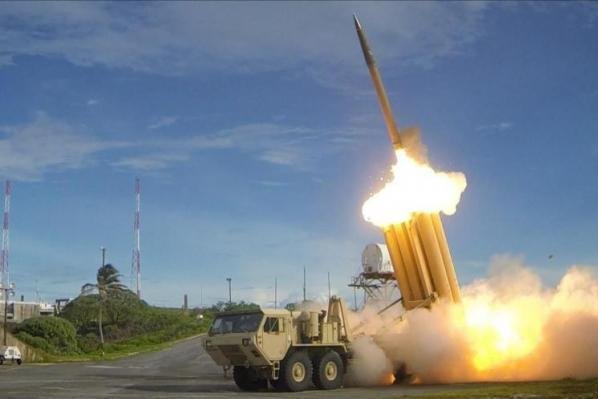The U.S. military recently demonstrated the safety of THAAD, an anti-missile defense system, to South Korean reporters. Photo courtesy of the U.S. Missile Defense Agency
SEOUL, July 18 (UPI) -- The United States showed reporters its THAAD battery in Guam to alleviate worries of radiation that have circulated among South Korean residents living near the designated location of deployment.
The journalists were shown Task Force Talon, a U.S. Terminal High Altitude Area Defense battery, Yonhap reported.
South Korean activists have been concerned about harmful radiation emitted from electromagnetic radar waves as well as the system's noise level.
U.S. military personnel demonstrated before South Korean reporters how radar waves reached a maximum of 0.0007 watt per square meter for the first six minutes at a location about a mile away from the system, well below the maximum radiation levels permitted under South Korean law.
U.S. military officials also told the media it would undergo safety checks in the area of Seongju, the designated South Korean location, for the sake of soldiers and residents before deployment, News 1 reported.
Other information, however, could not be disclosed for operational security reasons, including details on how the radar would detect and track North Korea's mid-range Musudan missiles.
Officials did say the U.S. air force operations center receives information and early warning on an incoming missile.
Those opposed to THAAD deployment in South Korea are challenging the claims, despite the evidence and demonstrations from U.S. and South Korea military.
Roh Hoe-chan of the minor opposition Justice Party said THAAD should be deployed in Seoul if the electromagnetic waves are as harmless as the government claims, Newsis reported.
THAAD doesn't guarantee the interception of North Korean missiles that could target Seoul or any other city in South Korea, Roh said.
Distrust between the residents of Seongju, where THAAD is to be deployed in 2017, and the government, still looms large.
On Monday residents also said they felt their position was not receiving adequate coverage from the media, No Cut News reported.
On Friday, Seongju residents pelted the South Korean prime minister with eggs during his visit to the town and left him stranded in his car for hours.















